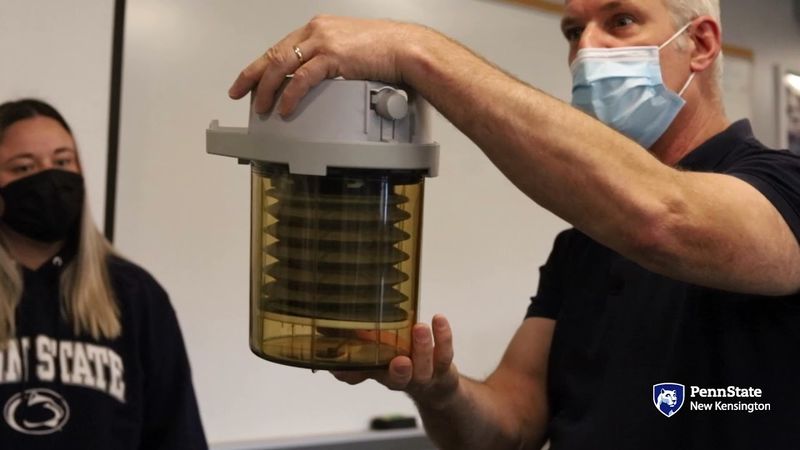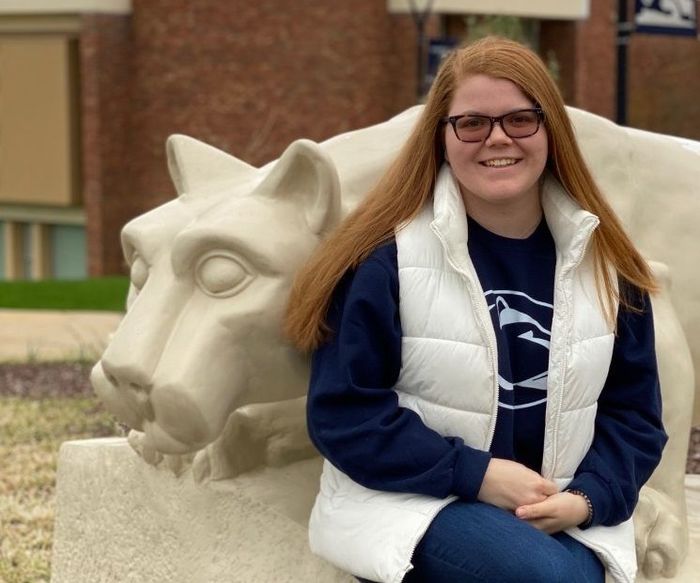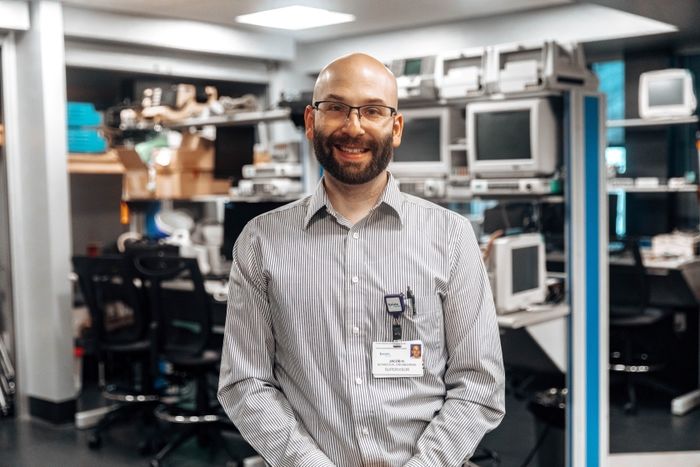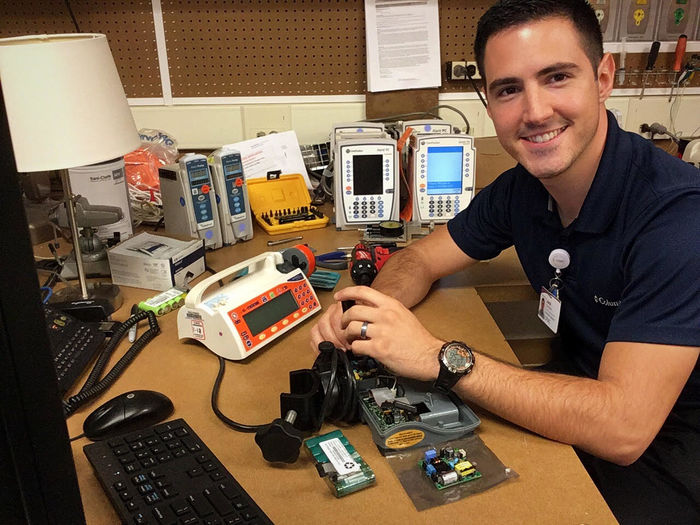Michael Shtur, Biomedical Engineering Technology alumnus
Zachary Burns, Biomedical Engineering Technology alumnus
Why did you choose Penn State New Kensington, and more specifically, the BET program?
There were many reasons that I was interested in the BET program at Penn State New Kensington. Some of those being that I have always been a big Penn State fan, so furthering my education at a school I have such high regard for was a dream come true. On top of that, the cost of the education, the excellent curriculum, and the high employment rate of the graduates was also a huge plus for me. I always wanted a career that would be interesting for me and let me continue to learn as I grow in the field.
What are your strengths and interests, and how did the BET program help to engage you as a student?
I have always enjoyed technology. Working with computers, networking, tearing things apart, and troubleshooting holds my interest and helps me continue to be excited to work in this field. The program gave me a fantastic foundation in each one of these areas. The ideas introduced in classes teach the students valuable information, but more importantly let the students learn to think more critically.
What part of the BET program resonated with you the most – the hands-on work, the medical aspect, technical work, the idea of helping those in need, or something else entirely?
The parts of the program that resonated with me the most during my time at Penn State New Kensington changed as I progressed through the curriculum. At first, I really enjoyed the technical work. I liked gaining confidence in my ability to tear something completely apart and being able to put it back together successfully. After completing my internship, it really changed my feelings to where my interests because I got to see the devices that I worked on being used. This changed it from a confidence in myself and in my ability to a confidence in the change and positive impact that I was making within a hospital.
What was your favorite class or activity during your time in the BET program?
My favorite classes during my time at Penn State were the BET classes. The faculty is fantastic and always gives each student vast opportunities to understand each device and topic. The topics are always described well, and the lab portion of the classes gives each person another chance to fully understand each subject.
Can you talk about your internship experience(s) while in the program?
I interned with a field service company out of Pittsburgh. I learned a lot during my internship and was exposed to many different types of devices, but more importantly, it taught me how to interact with customers.
What have you already done and what do you hope to continue to do with your degree?
After completing my degree, I worked at a hospital as an entry-level BET and grew to a management role by the end of my time there. Currently, I work in field service traveling the area installing and repairing patient monitoring systems. Although I continue to learn daily at my current job, I continue to use the information that I learned at Penn State New Kensington every day, and for that I am grateful for the education that I gained during my time on campus. In the future, I plan to continue working in field service and broaden my scope of working with a few IT certifications.
Why should prospective students consider the BET program?
A prospective student should consider the BET program because they have so many options for career opportunities coming out of the program. I have taken both two main options that are available to someone coming out of the program. One option is being a biomedical technician. As a biomedical technician, the student will get to work in a hospital and work on a wide array of devices: getting to learn devices daily, helping fellow biomedical technicians, and learning how to interact with clinical staff. It’s a fantastic degree. The other option is to get into field service. Being in field service, I travel around installing and repairing patient monitoring systems. I have been able to meet so many different individuals and help biomedical technicians as well as their clinical staff solve their technical issues. This role has given me time to focus on a few devices while trying to learn the most I can about them.
In your opinion, what does it mean to be a Penn Stater?
Being a Penn Sater means that each person is lucky to be a part of the largest alumni group. I have been to countless places all over, and it is always interesting when I find out someone else graduated from Penn State. It’s fantastic to see how the graduates communicate with each other and feel a sense of camaraderie because of this.
Dalynn Park, Biomedical Engineering Technology alumna
Why did you choose Penn State New Kensington, and more specifically, the BET program?
I chose BET because I wanted to do something to help people within the medical field, but not be on the clinical side. Biomeds are the people behind the doctors helping within healthcare just as much, just in a different light.
What are your strengths and interests, and how did the BET program help to engage you as a student?
I was very interested with the ability to work hands on and technically with medical devices. During my college search process, I looked into a 4-year biomedical engineering degree, but it focused a lot on the design and manufacturing of equipment. What appealed to me the most about the BET program at PSNK was the hands-on tinkering aspects.
What part of the BET program resonated with you the most – the hands-on work, the medical aspect, technical work, the idea of helping those in need, or something else entirely?
The portion of BET that resonated the most with me throughout the program was leaning that behind the medical heroes, there was biomed. Without the workings of a biomedical engineer, there would be major gaps in patient care due to lack of functional equipment. For the doctors to save or improve the life of patients, they need the devices to do their job, and the ones maintaining, fixing, and checking those devices are biomeds. I once was told that biomeds are the caped shadows behind of the heroes. It was a comment I have never forgotten and I think of daily.
What was your favorite class or activity during your time in the BET program?
My favorite class in the BET program was our BET labs. In labs, we got to use our knowledge from lectures and put it into action. Our lab instructor is a current BET within a local hospital system, so he would come to campus straight after his hospital shift. With each device-specific lab, we got a detailed lab procedure for preventative maintenance and common fixes, but we also got story time from our lab instructor about experiences within the field.
Can you talk about your internship experience(s) while in the program?
I completed my internship experience at UPMC Children’s Hospital of Pittsburgh in the summer of 2020. From day 1 of entering the program, I knew I wanted to complete my internship there. We had gone on multiple hospital tours throughout the city, including Children’s, and I fell in love with the environment. Though my internship was a little different because of the COVID-19 pandemic, I was immersed into the hospital setting, given responsibilities, and received true in-the-field training. The internship very much tied all the loose ends together from what I learned through lecture and labs. There is only so much that can be explained via classes, and what was not taught was taught through the internship. What was unique about my internship experience was 3 of the 6 guys within the shop were all PSNK BET graduates. It was a shared partnership that we all had since we all had been through the same program, and only a few years apart from one another. My internship also opened my eyes to the wide variety of specialties. I never really thought of dialysis being an area of interest until I spent time in the department during my internship. My interests took different turns due to exposure during the internship.
What have you already done and what do you hope to continue to do with your degree?
I have been able to attend multiple manufacturing trainings to expand my technical repertoire. I have been able to specialize in OR and dialysis equipment while only being in the field for a short 3 years.
Using my BET degree, paired with a BBH bachelor's degree that I graduated with in Summer of 2023, I hope to continue helping people from a combined technical and clinical side. My BET degree has been able to help me understand the technical happenings of clinical procedures. My BBH degree is allowing me a perspective on why things happen in health and patient care, and thus explaining why devices and equipment do what they do from the doctors.
Why should prospective students consider the BET program?
Prospective students should consider the BET program for many reasons.
- Job availability- not many people know about BET, and most of the current working population is on their way to retirement. Job opportunities are vast and people are needed to fulfill them.
- Not a boring job- I can confidently say that in the last 3 years of working, I have not repeated the same day twice. I don’t sit at a desk from 9-5, rather I’m roaming hospital floors, sitting in on OR cases, or tinkering with equipment. My job is very hands-on and active.
In your opinion, what does it mean to be a Penn Stater?
Being a Penn Stater means you are part of a well-known community. Since entering PSU for both an associate and bachelor’s degrees, I have felt supported by staff, students, and alumni. Penn State has provided numerous opportunities and support. Like I mentioned previously, I work with several alumni of the same program, and it is shared experience between us all. Being a Penn Stater also means there is known precedent of knowledge. Penn State is well-known for producing well-taught, job-ready individuals, particularly within engineering. I was able to get my foot into several doors just because I was a Penn State graduate.
Jacob Hetu, Biomedical Engineering Technology alumnus
Why did you choose Penn State New Kensington, and more specifically, the BET program?
I originally started off at Penn State Behrend with a different major. I grew up in New Kensington and currently live in Lower Burrell. My father went to Penn State New Kensington, as well. I found out that my learning was more suited to the smaller class sizes, and I felt more at home there. I was also able to work and save money by living at home and commuting. In my opinion, the professors are more personal, accessible and take a greater interest in student learning when class sizes are managed. The previous department head, Myron, met with me over Christmas break to show me the campus and BET labs, and that made a great impression on me. Being on the Industrial Advisory Board, I have gotten to work with the current program head, Joie, and I see the same qualities and interest in her students as my former mentor had. I chose the BET program because I have always loved building and fixing things and had an interest in technology. In the BET program and field, you not only learn what basically every piece of medical equipment is, but how to repair and maintain them. Those skills are transferrable into daily life outside of work, whether that is being more informed about healthcare or the abilities to work on your house or car. The BET field is a service-based industry, and students get to use their skills to directly impact patient care. Without us, nurses and doctors could not do their jobs as effectively. We get to help make a difference in the community, and that is something that initially drew me to the field.
What are your strengths and interests, and how did the BET program help to engage you as a student?
I have always had an interest and a knack for building and repairing things, whether that was helping my father and grandfathers or my own projects. The BET program kept me constantly engaged. I really enjoyed the focus on the hands-on labs and learning. During class, we got to pick up tools and open up and work on equipment. Furthermore, most college students do not have a lot of experience with hospitals or medical equipment. Everything was new and exciting, and I found it very interesting. One of the final projects was a presentation on a medical device. I remember doing mine on a surgical robot and thinking how cool it was to see new technology being developed. The equipment and innovations are like living science fiction.
What part of the BET program resonated with you the most – the hands-on work, the medical aspect, technical work, the idea of helping those in need, or something else entirely?
I would say it is a combination of everything. I find that I learn hands on better than just lectures. The feeling of working on something with your hands and seeing the results of a repair still fills me with pride almost 10 years later. Being in the medical field has never been more important or fulfilling than now since the COVID-19 pandemic. Our work is highly technical and skilled and that makes our field important and meaningful. All jobs are important in their own ways, but being in the medical field, we get to help save lives and return people back to their families. In my opinion, there is nothing more important than that. I have an vintage GE poster in my office that ends with “Because at the end of the day, you are the one that needs to keep the well-oiled machine oiled. Because you are a Biomed.” Biomeds are unsung heroes of healthcare, but I think I can speak for many of us in the field when I say the sense of pride in our jobs is more important than recognition.
What was your favorite class or activity during your time in the BET program?
I really enjoyed getting to test electrosurgical units on steak and seeing how the different modes cut. I also enjoyed the hands-on lab learning how to use and test the equipment, especially the defibrillators. All the core BET classes were interesting and engaging. I still run into some of my classmates in the field today and work with others in various forms. Jeff and Ted always had cool labs, and since they are active in the field, they also have a wealth of hands-on experience that can only be learned and taught from first-hand knowledge.
Can you talk about your internship experience while you were in the program?
I had a great experience and did my internship at Excela Health Westmoreland Hospital. At the time, 3 of the 4 techs in the shop all went through the BET program, as well as the Director and Supervisor. I learned a lot through the internship and gained a lot of hands-on knowledge. It was really cool to see the job I would be doing, and also work on and see all the equipment that we learned about during class. Not only does the internship help you learn, it also creates connections with other people in the field. The biomed community is a close one, and everyone knows each other even if it is just by name. There was not an open position at Excela when I graduated, but I was able to find another job at a different health system with the help and recommendation of a few of the techs and my internship review.
What have you already done and what do you hope to continue to do with your degree?
After my internship concluded, I studied and passed my CBET certification and went to Level 1 x-ray training through RSTI. Continuing with the theme of the internship, when a position opened at Excela, I was asked to interview. I was hired on as a tech, and over the last 6+ years, I have moved into a lead tech position, and now Supervisor role. I hope to continue to learn and gain experience and eventually move into upper management.
Why should students consider the BET program?
The BET program offers a unique experience where one can gain useful skills and knowledge in a relatively short time. The field needs new biomeds as many senior and veteran technicians are retiring, leaving great opportunities for new graduates. The internship not only helps teach the student skills, but is one long job interview and can open doors. There are not many accredited BET programs, and the fact that you have an accredited associate’s degree in engineering from Penn State, instead of a certificate, is a huge bonus during the hiring/interview process. The connections you make during class and the internship will serve you professionally throughout your career. There are so many different career options and paths that you can chose with a BET degree: you can work for a health system servicing everything from the most basic equipment to highly specialized pieces; there are management opportunities and teaching opportunities; you can join medical sales and account management; you can work for a manufacturer traveling as a field service agent, or work at the headquarters for bench repairs, or even do system installs in new construction. Currently, the degree can even be used to bridge the gap between IT and medical device integration. It really is a program that can open doors.
In your opinion, what does it mean to be a Penn Stater?
I think that being a Penn Stater means doing the best you can with what you were given to make a difference in your community. When someone talks about Penn State, they almost always bring up THON. Acts of service are such a core to the culture of Penn State, and I believe that carries on into the professional lives of students after graduation.
Jack DeloStritto, Biomedical Engineering Technology alumnus
Why did you choose Penn State New Kensington, and more specifically, the BET program?
Growing up, I’ve always been great with my hands, starting with my first Jeep. My father would always help me work on it, and it wasn’t long before I was able to start doing work on it myself. A few years and two Jeeps later, I had an interest in doing something in the medical field, but I wasn’t sure if there was anything I could do that could utilize my skills. I ended up going to college and trying a few different majors, all while joining the Army National Guard as a Light Wheeled Vehicle mechanic. After about 3-4 years of trying different career paths at other institutions, I still did not feel like I was doing what I was supposed to do.
That’s when my friend recommended that I talk to his father who works at Mercy Hospital as a biomedical technician since he knew I was good with my hands and had an interest in the medical field. Before that conversation, I had no idea what a biomedical engineering technician was or what they did, but right then, I had the feeling that I was finally onto something good. Alan recommended Penn State New Kensington (PSNK) and it’s BET program and directed me to Myron Hartman. I met with Myron, and he explained how PSNK was one of the best schools in the entire country for this program due to its accreditation by the Engineering Technology Accreditation Commission of ABET. Myron was able to see what credits would transfer from my previous course work and created a class schedule for me. I enrolled into the program that day!
What are your strengths and interests, and how did the BET program help to engage you as a student?
In terms of strengths, i’d probably have to say dedication. When I started the program, I was newly married and had gone through some schooling already, so I did not want to waste any time getting through the program. Dedication, remembering why I was there and who I was doing this for (my wife and I), helped me to stay focused and resulted in doing well through the program.
What part of the BET program resonated with you the most – the hands-on work, the medical aspect, technical work, the idea of helping those in need, or something else entirely?
I would say that hands-on work, technical work, and the idea of helping those in need really go hand in hand. One thing to remember about this field is that YOU, as a biomedical engineering technologist, are making a difference in the hospital and actually get to see for yourself just how you are making that difference. You see it when you’re working in the field and see a patient on a piece of a equipment that you serviced. The professors at PSNK do a fantastic job preparing you for that reality. When we work, it’s not about us; it’s all about the patient and helping to ensure their safety!
What was your favorite class or activity during your time in the BET program?
My favorite class would be any class that was directly BET-related. Basic college courses are required in the program, but the BET courses were the most interesting to me. We got a whole lot of hands-on training on different types of equipment in the BET lab. Our class was pretty close, and we had a lot of fun just about every day of our BET classes. We still keep a group message thread going and stay in touch because of that.
Can you talk about your internship with Children’s Hospital?
My internship with Children’s was with their clinical engineering department, which is the department of biomeds for the hospital. Throughout my internship, I got to work on all types of equipment. One thing about this field is that it is changing constantly. Equipment is constantly being updated, so you’re always seeing something new. I was able to go around to departments in the hospital, both with or without other biomeds, and service that department’s equipment. Each day was certainly busy and filled with different learning opportunities. The biomeds at Children’s were nothing less than extremely kind and helpful. They are very knowledgeable in their specialties and were always willing to show me different operations or equipment. With them, I never felt like I was in the way. The shop there was like a family, and a very funny one at that.
What do you hope to do with your degree?
I was hired for the Clinical Engineering Gen I position at Children’s! Another thing about this field is that there are many different opportunities and career paths. A biomed can work in a hospital environment, field service, or for a manufacturer just to name a few! The medical field is not going anywhere, so neither are biomeds. Personally, I want to work in the hospital field, but I am excited to see where my career takes me!



